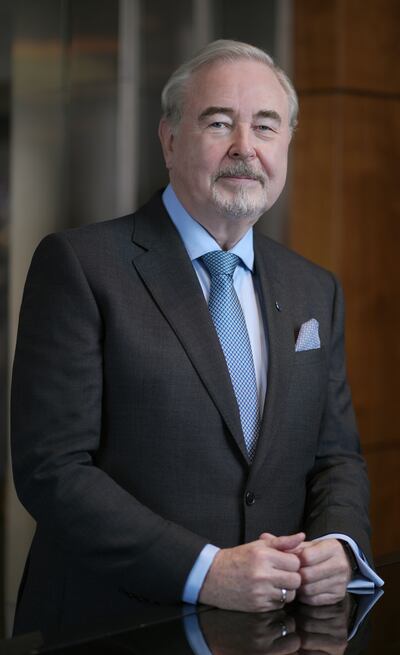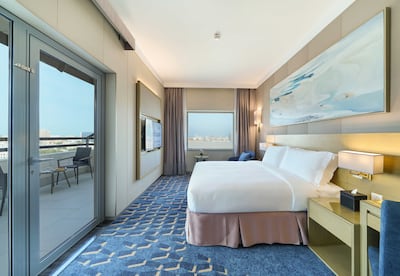Abu Dhabi hotel operator Rotana is exploring franchise deals in Pakistan, Africa and Europe to grow its footprint in new and existing international markets, its new chief executive has said.
The hospitality group is currently in discussions over “significant” opportunities to expand its presence globally through the franchise model, Philip Barnes told The National.
“We are looking at expanding on some of our franchise properties because there's an opportunity for us there. I'm going to Pakistan in a few weeks time, for example, to look at opportunities that may exist there. We're also looking at other parts of Africa.”
In the UK, he sees future potential for expansion in cities such as Manchester, Liverpool and Leeds through franchise deals after the company gains a foothold in the market with its first two managed properties in London.
In Russia, where it already has two franchise properties, the company has signed an additional two deals and is in discussions for more.
The group is also in talks about partnerships with global hospitality brands to grow its footprint in other parts of the world through co-operation on sales, marketing and loyalty programmes.
“We're looking at some strategic alliances with other organisations that are a good match for Rotana, who have a similar culture and a significant presence in other parts of the world, to see how we can align ourselves with them and vice versa to give us greater penetration into a more significant part of the world,” he said.
Mr Barnes took the helm as chief executive on March 1, replacing Guy Hutchinson. In his decades-long career, Mr Barnes held senior leadership positions at global hotel brands, including nearly 25 years with Fairmont Hotels and Resorts.
He also held managerial roles with Four Seasons and Shangri-La.
Rotana currently operates 76 hotels in markets across the GCC, Middle East, Africa and Europe, with plans to grow to 86 within a year, amid a strong pipeline in Saudi Arabia and the UAE, Mr Barnes said.
The company aims to reach up to 130 operating hotels in five years, as it adds 10 to 20 new properties to its portfolio annually, which is an “ambitious and aggressive target, but also doable”, he said.
Bookings for Rotana hotels across the group during the first quarter mainly came from Gulf countries.
About 30 per cent of reservations were from GCC countries, 24 per cent from Europe, 8 per cent from Russia, 3 per cent from the US and 2 per cent from China, according to the company's data about its key feeder markets.

Geopolitical headwinds
Rotana group recorded a strong start to the year, with overall occupancy reaching 75 per cent across all its hotel brands that include Rotana Hotels & Resorts, Rayhaan, Arjaan, Centro and The Residences in the first quarter of the year.
Revenue per available room, a key industry measure, reached $190, while the average daily rate stood at $250 during the first three months.
But as the Israel-Gaza war rages on, the hotel group recorded a drop in bookings at its properties in Lebanon and Jordan as the countries border the conflict zone.
Bookings at its two hotels in Lebanon dropped by 32 per cent year on year during the first quarter. Overall, Lebanon's hotel industry recorded a 40 per cent drop in business during the period, according to hospitality data company STR.
“In Lebanon, we've seen a significant impact. We are in Beirut and we've seen a huge impact there as a result of what's going on,” Mr Barnes said.
Hezbollah is engaged in daily cross-border exchanges of fire along the Lebanon-Israel frontier, amid heightened tension in the Middle East after Iran's unprecedented assault on Israeli soil.
“We are deeply saddened by the tragic events unfolding in the midst of the ongoing conflict. From a tourism and hospitality perspective, we acknowledge the challenges the region faces, but we also believe in its resilience,” Mr Barnes said.
Meanwhile, Rotana's hotels in neighbouring Egypt has recorded a 10 per cent annual increase in bookings during the first three months of the year.
Bullish outlook
However, there has been no impact from the Gaza war on its business in the UAE and Saudi Arabia, which have stable environments and strong macroeconomic growth, Mr Barnes said.
“The UAE is perceived around world as safe, stable and friendly – it has everything going for it,” he said.

Looking ahead, the Rotana group is forecasting 15 per cent year-on-year growth in profitability in 2024, Mr Barnes said.
Rotana's hotels in the UAE are expected to record a 5 per cent to 10 per cent annual increase in their bottom line this year, while the profitability growth rates will vary in other markets.
“Some markets will be in a loss situation. But where the markets are strong, I think they will continue to be very strong this year,” he said.
Regionally, Rotana is set to launch seven new properties in Saudi Arabia over the next four years, doubling the number of hotel rooms in the country to more than 4,400.
The Saudi portfolio includes four planned Edge by Rotana properties in Riyadh, an Edge by Rotana property in Al Baha, and the coming opening of Al Manakha Rotana in Madinah.
In the UAE, Bloom Arjaan by Rotana on Abu Dhabi’s Saadiyat Island, featuring 217 serviced hotel apartments, is also scheduled to open this year.
So far in 2024, Rotana has opened three new properties, including Dar Rayhaan by Rotana in Al Khobar, Saudi Arabia, Riviera Rayhaan by Rotana in Doha and Bomonti Arjaan by Rotana in Istanbul.


